Last Update: September 3, 2015
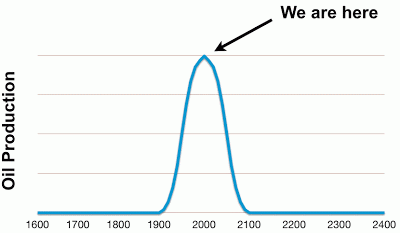
A little-mentioned key reason for switching to electric vehicles is the Peak Oil problem. The Peak Oil theory, which has been verified through lots of observation, is based on the typical production decline once half of an oil field's reserves have been extracted. Before the half-way point, the drilling company is extracting the "easy stuff", but as time progresses the oil is harder and harder to extract - kind of like drinking a milk shake, and after a certain point it becomes hard to suck out the good stuff. Oil production declines after the half-way point because it's simply harder to extract oil. While the oil companies have various Enhanced Oil Recovery (EOR) techniques, they only prolong the inevitable point after which it's not worth attempting to extract oil from the depleted field.
The Peak Oil theory is an extrapolation of this observation. Statistically combining the declines of all oil fields in a region, or around the world, gives a predictable global peak of oil production. While the various oil fields will be in different states of health or decline, it's the sum of all oil fields that is global crude oil production. Once enough oil fields go into decline, total global oil production will begin its decline.
That point - when the oil companies can no longer increase oil production - raises alarms. Because of the general dependency on crude oil based fuels to drive all our machines, the project of modern society is predicated on oil production increases matching oil consumption demands. Those demands are driven by population and economic activity increases. As long as global population keeps increasing, and the crude oil consumption per person stays the same or increases, then crude oil production must increase in order to keep the global economic machine ticking.
What happens if population keeps increasing but the oil companies can no longer produce more crude oil products? Here's a couple issues...
- The fertilizer used to grow crops is directly derived from crude oil. Limited crude oil production declines will impact fertilizer production and therefore impact crop/food production, resulting in Global famine.
- The global economic system is predicated on global shipment of goods and services using crude oil powered airplanes or ships or trains or trucks or cars. Declining global oil production will mean an inability to keep that system functioning.
- Competition for resources should cause an increase in wars. For example the 2003 invasion of Iraq was clearly about maintaining access to oil supplies, and had nothing to do with the Sept 11, 2001 attacks. The Gulf War 2 set off an intense fight over the future of the Middle East that's spread way beyond Iraq. The whole of the Middle East is enduring extreme pain and suffering over this problem.
- Growing fuel shortages should increase fuel prices, and make it harder to keep economic activity going, hence a global depression is likely to ensue.
The Mad Max series of movies had a Peak Oil crisis as its backstory. Carefully watch Mad Max and The Road Warrior and notice how the struggle is caused by a decline in oil production. In Mad Max: Beyond Thunderdome they reconceptualized the crisis a bit to include a nuclear war that blew up the cities, but the original two films were about Peak Oil. It's hard to say whether the actual peak oil crisis that we will endure will be as bad as those movies.
Peak Oil Discredited? Not so fast
The prediction was for a global peak of oil production in 2005. After that date, serious problems would erupt around the world. The generally accepted wisdom is that oil production did not peak in 2005, and that the serious calamities just outlined did not occur.
A lot depends on how you interpret the events of the last 15 years. Isn't there serious calamity underway? The war situation in the Middle East is going from bad to worse to worser to worserer to worsererer to extremely horrible and beyond. ISIS is a complete horror story, and the whole Syrian War thing is causing an enormous humanitarian crisis as civilians are forced to flee their former lives and seek new lives elsewhere.
The root cause? It's that the USA invaded Iraq in March 2003, and before that Western powers spent decades messing around in Middle East politics, all of which was meant to ensure access to oil supplies. In Iraq, the USA sought to change the government in Iraq in order to change the oil laws in Iraq so that western Oil companies could operate in Iraq. There's lots of other examples such as the early 1950's overthrow of Iran's democratically elected moderate government that led to 25+ years of brutal rule by the Shah of Iran. The cause? A dispute between British Petroleum and Iran's government over drilling rights.
But let's not get distracted ...
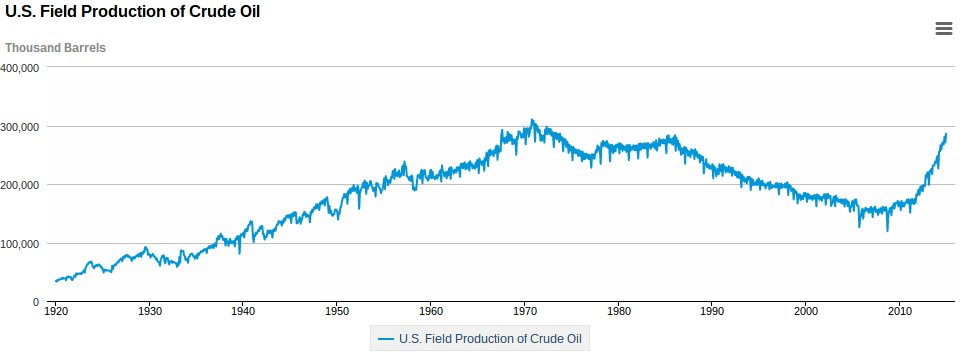
But, global oil production did not decline in 2005, and has instead increased. This chart shows US oil production, which peaked in 1971 at about 300,000 bbl/month, then fell to 150,000 bbl/month in about 2008-9. Remember in 2007-8 a Big Problems in the USA was historically high gasoline prices. The price was high enough to cause a political stink during the 2008 election, until the economy collapsed nearly into a major Depression around September 2008.
The response to diminishing domestic US oil production was to import oil from elsewhere. At one point the US imported about 60% of its crude oil consumption, putting the US at risk of manipulation from oil producing countries.
Notice the production increase following 2010. In just a few years US domestic oil production has recovered almost to where it was in 1971. What happened?
Fracking happened.
Without fracking, oil production would have continued declining until the calamities mentioned above would have become a reality. Does this mean Peak Oil is bogus, then?
Nope.
Fracking is simply delaying the inevitable. The first chart is purposefully vague about the length of the Age of Oil. It doesn't matter what enhanced oil recovery techniques are used, the Age of Oil will eventually come to an end. Fossil fuel resources are a finite resource, and will obviously run out.
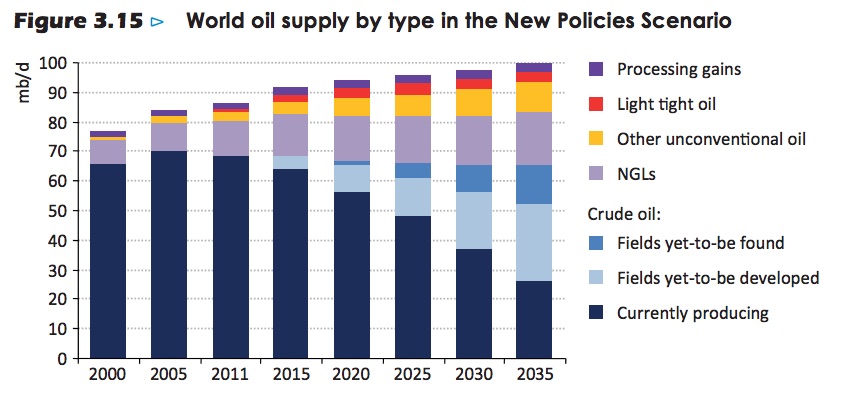
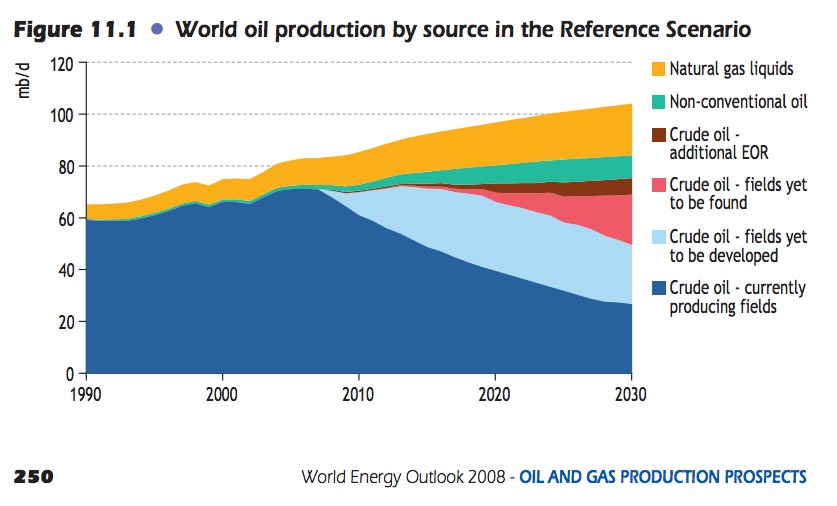
The International Energy Agency produces a yearly report, World Energy Outlook, discussing not only the prospects for "energy" (primarily fossil fuels) production around the world, but also the environmental impact. [WEO2008] [WEO2012] [WEO2014]
These charts are reassuring in that they show continuing increases in global oil production. Look carefully and you see two sources labeled "fields yet to be found" and "fields yet to be developed". The whole presumption that the oil game will continue as it is relies on finding oil fields that are yet to be found. Further, the wedges labeled "tight oil" and "other unconventional oil" is produced by techniques like Fracking.
A big question is whether the "fields yet to be found" and "fields yet to be developed" will actually materialize? And what if they do not?
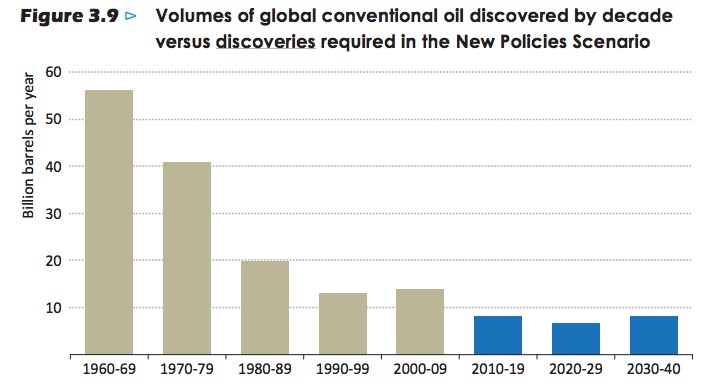
Compounding the problem is that the rate of discovering new oil fields has fallen dramatically. How do they expect to find new fields (fields yet to be found) with the rate of discovery falling like this?
The chart talks about "conventional" oil discoveries, meaning the easy-to-extract stuff where you simply drill a well and pump out the oil. There may be other discoveries happening, which would be some kind of unconventional oil, and most of those sources require fracking.
These charts show that continuing to use crude oil products like gasoline or diesel will require fracking. And other enhanced oil recovery techniques. All those techniques are extremely energy and resource intensive.
Why keep Fracking when Solar+Wind+Energy Storage has such bright possibilities?
Elsewhere we discussed a truism going around saying oil refineries require 6 kWh of electricity to refine a gallon of gasoline. It's difficult to make a proper accounting of that claim, but it is clear that a massive amount of resources of all kinds, not just electricity, goes into crude oil refining.
Frack'd oil or natural gas requires far more resources than regular conventional oil products. With conventional oil you drill a hole and pump out crude oil that's ready for the refinery. Fracking shale deposits requires an intense process of massive amounts of water and sand and various chemicals pumped underground at high pressure. Only then will the oil or natural gas flow, and that oil requires further processing before it can be shipped.
Looking at the 6 kiloWatt-hour question raised a question: What is the best application of that electricity and other resources? The 6 kWh can drive an electric car a similar distance to the gasoline, so why not skip all that stuff at the refinery and use the electricity as it is? Bringing fracking into the picture raises the intensity of that question. Fracking is causing massive ills, plus it is even more energy intense, and therefore why are we allocating the resources in this way?
Renewable energy technologies are getting better every year. In many cases Wind and Solar are cheaper than fossil fuel based electricity. That means there's a big problem to solve in energy storage systems to correct for the intermittent nature of wind and solar energy.
When Wind and Solar were small potato's the energy planners could more-or-less ignore them. Now that Wind and Solar is gaining a firm financial footing, and is poised to take a prominent role in electricity production, it's no longer possible to more-or-less ignore their potential. Energy storage systems are required to time-shift excess wind or solar electricity from the time of production to other times of day. With enough of both wind/solar and energy storage, our cities could run completely on renewable electricity.
Unfortunately US government policy makers at the time of this writing (May 2017) seem dead-set on preserving the role of fossil fuel companies in producing "energy" supplies. Which, as the data above demonstrates, will require expanded use of fracking.
Fracking is poisonous
Oil companies claim they cannot disclose the chemicals used in hydraulic fracturing because of trade secret considerations. Each company doesn't want their competitors to know their chemical mix .. because .. competition. It means the Environmental Protection Agencies of the world don't know what is being done, doesn't know whether fracking operations are healthy or harmful, etc.
The fracking process [FrackingOverview] requires pumping water laced with fracking chemicals, plus sand, under pressure, into shale formations underground. The chemicals and the pressure force the rocks underground to crack, and the sand is meant to hold the fissures open. The fossil fuels then leak out, and can be extracted.
Supposedly the fracking fluids are trapped within layers of impermeable rocks, and there's no risk to ground water. But reports have shown this to be false, and that in some cases ground water does get poisoned by fracking fluids.
A paper published in January 2017, A systematic evaluation of chemicals in hydraulic-fracturing fluids and wastewater for reproductive and developmental toxicity, [Nature1] [Nature2] [HuffPost1] made an inventory of over 1000 chemicals used in fracking fluids (n=925), appear in wastewater from fracking operations (n=132), or appear in both (n=36). Of those, they had no toxicity information for 781 chemicals (76%). Of the remaining 240 chemicals, 103 (43%) are known to cause reproductive problems, 95 (40%) produce developmental problems, and another 41 (17%) are known to cause both.
It shouldn't be surprising to learn, then, that occasionally fracking workers die when exposed to the chemicals. In May 2014, a worker at an exploratory fracking site in Romania died after exposure to fracking chemicals. [Longtailpipe1] Chevron, the company in charge of the operation, hushed up the story, and instead we learned of it through a Facebook post by an activist. A few other instances are known.
Another problem faced by fracking workers is Silicosis. [Wikipedia1] This is similar to "black lung disease" in that "silica" gets into the lungs causing problems. Workers who breath in fracking sand particles can develop this disease.
Fracking and induced earthquakes
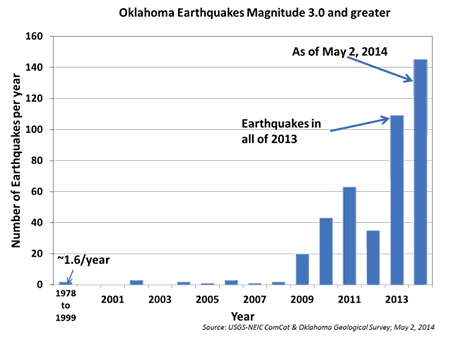
In some areas, like Oklahoma and Kansas, fracking operations are almost certainly causing earthquakes. [FrackingInducedEarthquakes] The earthquakes aren't caused by the fracking operation itself, usually, but by disposal of the produced water (waste water).
After a fracking operation, a tremendous amount of water returns to the surface. That water is also highly toxic, and may even contain radioactive material. It must be disposed of in some way, and often disposal is done by pumping the produced water back underground. If that disposal occurs near a geologic fault, it can induce an earthquake.
In parts of Oklahoma and Kansas, areas with traditionally very few earthquakes, a flurry of earthquakes has corresponded to increased fracking activity.
Summary
We've barely touched the surface of problems caused by fracking.
This book is about electric vehicle charging, so why did we go into so much detail about crude oil, peak oil, and fracking? The point is that there are many costs involved in the prevailing fossil fuel energy paradigm. The environmental and social cost of fracking is not widely recognized. But we need to account for that cost in thinking about how we power our vehicles.


